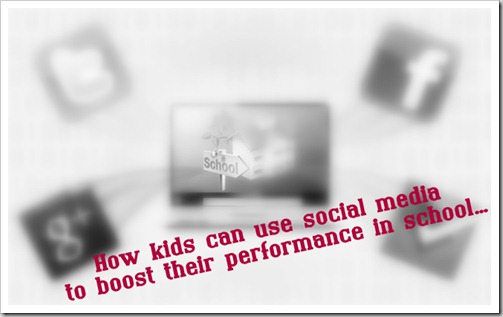The power of social media has still not been harnessed in Indian classrooms as much as it should be. Schools and educational institutions are busy banning Facebook, Twitter and other social media platforms rather than seeing how they can be integrated into the curriculum.
Kids on the other hand are caught between using technology and social media at home and restraining their use in school. Indian schools and educational institutions have already come a long way and if they simply start investing in the power of social media, kids will be able to use it to boost their performance at school and otherwise.
Citizen journalism on Twitter, attending remote lectures, learning a language through Skype, accessing permissible documents of other online libraries, getting instant feedback on projects or taking the help of co-students to solve queries are just some of the thousands of benefits of kids using social media in the right way.
Let’s take a look at how this can be done.

Contents
Connecting with students worldwide
For those students wanting excel by growing beyond the mediocre, being at par with what’s happening in international classrooms is essential. Whether it’s through blogs, Facebook, Google+ or LinkedIn, students can join relevant communities online and get an overview of what’s being discussed and opined in the real world vis-a-vis what they’re studying in their textbooks. For students of higher age groups who are on the threshold of getting into university, it becomes crucial to know where they stand in terms of their aptitude and IQ on an international level. A student of Class 7 learning Physics may have a completely different way of studying molecules and atoms than a student in India. And only a blog or a social media platform can bring this to light.
Following real world events
Whether an Indian student is gearing up for an IIT entrance test or a NID exam, they all know the importance of high score in the general knowledge (GK) area. Imagine how important it would be to follow important political and social personalities on Twitter, or to share blogs about the recent 2012 India Auto Expo show or to learn how to access an ICICI bank account on Facebook! An RSS Feed from relevant sources all across the internet will allow a student to effortlessly build his/her pool of general knowledge, not having to study and cram it on the last day, as most students unfortunately do.
Using apps and sharing results
Apps like EduComp Online have already become very popular in Indian schools. Additionally, educational apps like My Open Campus, Math Ref, Molecules, Blackboard Mobile, amongst many other resources will help kids to be a part of online classrooms, share project ideas, take online quizzes, tests and exams, have handy references, access other students’ assignments for reference and so on to help them rise a notch above their regular exposure to a certain topic in school. And what’s more, sharing results and observations of using educational apps on a class or community twitter page is only going to strengthen a student’s competitive edge.
Find a host of other educational apps for younger age groups here and here. Education apps in iTunes also offer a plethora of resources.
Online Wikis
Many schools set up internal wikis through which students and teachers can add, edit and develop a certain learning theme so that it doesn’t have to be taught as a traditional lesson plan. The incentive here is "the more you link and share, then more you learn and the better grades you get". Since the medium of learning itself becomes so exciting, kids automatically boost their performance by taking initiatives to learn, present, interact, comment and develop. Online wikis are tools that act like the internal social media of a school.
Videos and podcasts
If you thought we were about to say "Watching educational videos online" as a way for kids to boost their performance in school, then that’s passé already. Project podcasts, students recording their own presentations on YouTube and students learning to remove their speech and writing disabilities by hearing their recorded voice is the fad of the day. India will gradually see the integration of learning with podcasts and videos, but schools in the West have already started witnessing increased performance of students via this social media tool.
Imagine the rise in the potential of a student in India podcasting a review about his/her favorite book and the being rewarded on the basis of scoring the maximum number of views?

Nice written article.
writer has a good thought for new education system .